This article was co-authored by Tasha Rube, LMSW. Tasha Rube is a Licensed Social Worker based in Kansas City, Kansas. Tasha is affiliated with the Dwight D. Eisenhower VA Medical Center in Leavenworth, Kansas. She received her Masters of Social Work (MSW) from the University of Missouri in 2014.
There are 10 references cited in this article, which can be found at the bottom of the page.
wikiHow marks an article as reader-approved once it receives enough positive feedback. In this case, 91% of readers who voted found the article helpful, earning it our reader-approved status.
This article has been viewed 146,906 times.
Schools often have special programs for gifted children, and can identify a gifted child based on IQ scores and standardized tests. However, you should not be entirely reliant on your school to discover if your child is gifted. There are a great number of factors you can use to identify a gifted child, some of which are overlooked in traditional educational settings. If your child is gifted, you want to make sure they receive the special attention necessary to thrive. You can spot a gifted child by an advanced capacity for learning, excellent communication skills, certain thought patterns, and a high capacity for empathy.
Steps
Examining Learning Abilities
-
1Pay attention to your child's memory. Gifted children tend to have a greater memory than average children. Oftentimes, you may notice memory in unexpected, somewhat subtle ways. Keep an eye out for signs of a superior memory.[1]
- Children may remember facts better than others. Gifted children often memorize facts very young, often for their own fulfillment. Your child may memorize a poem they like, or portions of a certain book. Your child may also memorize things like state capitals and state birds.
- Watch for signs your child has a superior memory throughout the day. You may notice your child easily recalls information from books or TV shows. They may also remember events in excessive detail. For example, you may find, after a family dinner, your child remembers everyone's name, including people they had only heard spoken about, and can easily remember physical characteristics of individual family members, such as hair color, eye color, and clothing.
-
2Look into reading skills. Early reading is often a sign of a gifted child, especially if a child teaches themselves to read and write. If your child was reading before they entered school, this is a sign your child may be gifted. You may also notice your child reads at an advanced level. They may score high on standardized test for reading and comprehension, and teachers may notice your child reading frequently during school. Your child may actually prefer reading to physical activities.[2]
- Keep in mind, however, reading is only one of many signs of a child being gifted. Some gifted children may struggle with reading early on, as gifted children often work at their own pace. It's commonly known, for example, that Albert Einstein did not read until he was seven. If your child is not an advanced reader, but shows other signs of being gifted, they may still be gifted.
Advertisement -
3Evaluate mathematical abilities. Gifted children often tend to have an advanced level of skill in certain areas. Many gifted children are highly skilled in mathematics. As with reading, watch for high test scores and high academic achievement in mathematics. At home, children may enjoy doing puzzles and playing logic games in their spare time.[3]
- Keep in mind that, like reading, not all gifted children will be math prodigies. Gifted children have different areas of interest and skill. While math is certainly a common area of interest for gifted children, a child who struggles with math may still be gifted.[4]
-
4Consider your child's early development. Gifted children tend to reach developmental milestones earlier than their peers. Your child may have been talking in full sentences earlier than their peers. They may also have had a high vocabulary very young, and was able to engage in conversation and ask questions earlier than other children. If your child seemed to develop faster than peers, they may be gifted.[5]
-
5Think about your child's knowledge of the world. Gifted children are marked by a genuine interest in learning about the world. A gifted child may know a lot about politics and world events. They may also ask a lot of questions. Your child may ask you about historical events, family history, culture, and so on. Gifted children are often very inquisitive and take joy in learning new things. A gifted child may have a larger than average sense of the world.[6]
Assessing Communication Skills
-
1Assess vocabulary. As gifted children have higher than average memories, a strong vocabulary is a sign your child is gifted. At a young age, as early as 3 or 4, your child may use words like "understandably" and "actually" in every day speech.[7] A gifted child may also be able to learn new words quickly. They may learn a new word for a test in school, and quickly begin using it appropriately in conversation.[8]
-
2Pay attention to your child's questions. Many children ask questions, but a gifted child's line of questioning will stand out. Gifted children ask questions to better understand the world and the people around them, as they have a genuine desire to learn.[9]
- Gifted children will constantly ask questions about their environment. They ask about what they hear, see, touch, smell, and taste. You may be driving in a car, and a song will come on the radio. A gifted child may ask a lot about the song, about what it means, who sang it, when it came out, and so on.
- Gifted children also ask questions to gain insight and understanding. A gifted child may ask about other people's emotions, questioning why someone is sad, angry, or happy.
-
3Evaluate how your child participates in adult conversations. Gifted children are marked by an early ability to converse. While many children tend to go on about themselves when talking to adults, a gifted child will participate in the conversation. They will ask questions, discuss the topic at hand, and easily pick up on nuances and double-meanings.[10]
- Gifted children will also switch tone between conversations. You may notice your child uses a slightly different vocabulary and speaking style when talking to someone their own age than when talking to an adult.
-
4Think about the pace of speech. Gifted children do have a tendency to speak quickly. They tend to talk about subjects of interest at a faster pace, and may suddenly switch topics. This is often seen an inattentiveness. However, it's actually a sign your child has many different interests and curiosities.[11]
-
5See how your child follows directions. At an early age, a gifted child will be able to follow multi-step directions without trouble. They may not have to ask for a reminder or for clarification. For example, a gifted child might easily be able to follow a direction like, "Go to the living room, get the red-haired doll from the table, and put it in your toy chest upstairs. While you're up there, bring down your dirty clothes so I can wash them."[12]
Paying Attention to Thought Patterns
-
1Look at your child's unique interests. Gifted children are known to have passionate interests at an early age and are able to concentrate intensely on a single subject. While all children have unique interests, gifted children will be particularly knowledgeable about certain subjects.[13]
- Gifted children may want to read informative books about a certain subject. If your child is interested in dolphins, for example, they may frequently check out nonfiction books from the school library about the subject. You may notice your child has a deep knowledge of different types of dolphins, the lifespan of dolphins, their behavior, and other facts about the animal.
- Your child will genuinely enjoy learning about the subject. While many children develop an interest in, say, a certain animal, a gifted child may get giddy over watching nature documentaries and studying about that animal for a school project.
-
2Watch for fluid thinking. Gifted children will have a unique ability to problem solve. They tend to be fluent thinkers are able to look for alternative solutions and ideas. A gifted child may figure out a loophole in the rules of a board game, for example, or add new steps and rules to a common playground game to make it more interesting. A gifted child will also look to the hypothetical and the abstract. You may hear a gifted child posing "what if" questions when trying to figure out a solution to a problem.
- Due to the fluid nature of a gifted child's thinking, they may struggle in the classroom. Test questions with only one possible answer may frustrate a gifted child. Gifted children tend to see multiple solutions or answers. If a child is gifted, they may do better at essay tests than tests made up of fill in the blank, multiple choice, or true or false questions.[14]
-
3Look for imagination. Gifted children are imaginative by nature. Your child may love to play pretend, and to fantasize. They may have unique fantasy worlds. A gifted child may be highly adept at daydreaming, and their daydreams may be uniquely detailed.
-
4Observe how your child reacts to art, drama, and music. Many gifted children have a unique capacity for the arts. Gifted children may easily express themselves through art forms like painting and music, and also may have a higher than average appreciation for art.[15]
- Gifted children may draw or write as a hobby. They may also imitate others, often for humor, or sing songs they've heard elsewhere.
- Gifted children may tell vivid stories, whether fact or fiction. They may enjoy extracurricular activities like drama, music, and art, as they have a natural need to express themselves artistically.
Evaluating Emotional Capacity
-
1See how your child interacts with others. You can gauge whether a child is gifted based on social interactions. Gifted children have a unique ability to understand others, and genuinely try to empathize.[16]
- A gifted child may be sensitive to other people's emotions. If your child is gifted, they may be able to easily tell if someone is sad or angry, and may want to understand the reason behind an emotion. A gifted child will rarely feel indifferent in a situation, and will almost always be concerned for the wellbeing of those around them.
- Gifted children will be able to interact with people of all ages. Due to their advanced knowledge, they can talk to adults, teens, and older children with as much ease as they can communicate with those their own age.
- However, some gifted children have social difficulties. Their intense interests may make it difficult to interact with others, and gifted children are sometimes misdiagnosed as autistic. While positive social interactions are one sign your child is gifted, it is not the only sign. If your child has difficulty socializing, this does not necessarily mean they are not gifted, and some gifted children are also autistic.
-
2Watch for leadership qualities. Gifted children tend to be natural leaders. They have a great capacity for motivating and encouraging others, and seem to naturally fall into leadership positions. You may notice your child is generally the leader in a group of friends, for example, or that your child is able to quickly rise to a leadership position in extracurricular activities.[17]
-
3Evaluate whether your child values alone time. Emotionally, gifted children need alone time. Gifted children will enjoy spending time with others, but will not become bored or agitated if they spend time alone. They may pursue solitary activities, like reading or writing, and may sometimes prefer to be by themselves rather than hanging out in a group. A gifted child will rarely complain of boredom when not being entertained, as they have a great deal of intellectual curiosity that keeps them mentally stimulated.[18]
- When bored, a gifted child may only need a little "push" to start a new activity (e.g. handing them a butterfly net).
-
4Consider whether your child appreciates art and natural beauty. Gifted children have a high capacity for aesthetic appreciation. A gifted child may frequently point out beautiful trees, clouds, bodies of water, and other attractive natural phenomenons. Gifted children are also drawn to art. A gifted child may enjoy looking at paintings or photography, and may also be heavily influenced by music.[19]
- Gifted children may frequently point out things they notice, such as the moon in the sky or a painting on a wall.
-
5Consider other conditions. Conditions like autism and ADHD may have symptoms that overlap with traits of gifted children. Understanding the differences can help you figure out what exactly is going on. If you believe your child may have autism or ADHD, you should seek medical evaluation. Be aware that developmental disabilities and giftedness are not mutually exclusive; your child can have both.
- ADHD: Children with ADHD may, like gifted children, struggle in school. However, they tend to be less detail-oriented and may struggle to follow basic directions. While children with ADHD may talk fast, like gifted children, they will display other signs of hyperactivity like fidgeting and constant movement.[20]
- Autism: Like gifted children, autistic children may have passionate interests and enjoy alone time. However, autistic children will also display other traits, including social confusion, repetitive fidgeting, developmental delays, literal thinking, and under- or over-reactivity to sensory input (such as loud noises or hugs).[21]
Warnings
- Don't let your child think that being gifted makes them superior. Explain that everyone has unique talents worth appreciating, and everyone has knowledge they can teach your child. Encourage your child to see human diversity as worthwhile.⧼thumbs_response⧽
- Being gifted can be hard for children. Gifted children may not fit in easily with others. Help them to deal with it.⧼thumbs_response⧽
References
- ↑ http://www.forbes.com/2008/01/22/solutions-education-gifted-oped-cx_hra_0123gifted_slide_2.html
- ↑ https://www.psychologytoday.com/blog/gifted-kids/201105/is-your-child-gifted-what-look-and-why-you-should-know
- ↑ http://www.forbes.com/2008/01/22/solutions-education-gifted-oped-cx_hra_0123gifted_slide_9.html
- ↑ http://www.education.vic.gov.au/childhood/professionals/learning/Pages/idgiftedchildren.aspx
- ↑ http://www.babycenter.com/0_how-to-tell-if-your-preschooler-is-gifted_65003.bc
- ↑ https://www.psychologytoday.com/blog/gifted-kids/201105/is-your-child-gifted-what-look-and-why-you-should-know
- ↑ http://www.forbes.com/2008/01/22/solutions-education-gifted-oped-cx_hra_0123gifted_slide_2.html
- ↑ https://www.psychologytoday.com/blog/gifted-kids/201105/is-your-child-gifted-what-look-and-why-you-should-know
- ↑ https://www.psychologytoday.com/blog/gifted-kids/201105/is-your-child-gifted-what-look-and-why-you-should-know
- ↑ https://www.psychologytoday.com/blog/gifted-kids/201105/is-your-child-gifted-what-look-and-why-you-should-know
- ↑ https://www.psychologytoday.com/blog/gifted-kids/201105/is-your-child-gifted-what-look-and-why-you-should-know
- ↑ https://www.psychologytoday.com/blog/gifted-kids/201105/is-your-child-gifted-what-look-and-why-you-should-know
- ↑ http://www.forbes.com/2008/01/22/solutions-education-gifted-oped-cx_hra_0123gifted_slide_3.html
- ↑ http://www.forbes.com/2008/01/22/solutions-education-gifted-oped-cx_hra_0123gifted_slide_4.html
- ↑ http://www.forbes.com/2008/01/22/solutions-education-gifted-oped-cx_hra_0123gifted_slide_6.html
- ↑ https://www.psychologytoday.com/blog/gifted-kids/201105/is-your-child-gifted-what-look-and-why-you-should-know
- ↑ https://www.psychologytoday.com/blog/gifted-kids/201105/is-your-child-gifted-what-look-and-why-you-should-know
- ↑ https://www.psychologytoday.com/blog/gifted-kids/201105/is-your-child-gifted-what-look-and-why-you-should-know
- ↑ https://www.psychologytoday.com/blog/gifted-kids/201105/is-your-child-gifted-what-look-and-why-you-should-know
- ↑ http://www.helpguide.org/articles/add-adhd/attention-deficit-disorder-adhd-in-children.htm
- ↑ http://nationalautismassociation.org/resources/signs-of-autism/
About This Article
To identify a gifted child, first examine their memory, reading skills, and mathematical abilities. Then, compare your child’s learning faculties to other children their age for reference. Consider your child’s use of language, as gifted children tend to use complex vocabulary like ‘understandably’ and talk in fuller sentences. Additionally, if your child has a unique curiosity for the world around them and capacity for the arts, among other signs, they may be gifted. For more tips from our Social Work co-author, such as how to evaluate emotional capacity, keep reading!


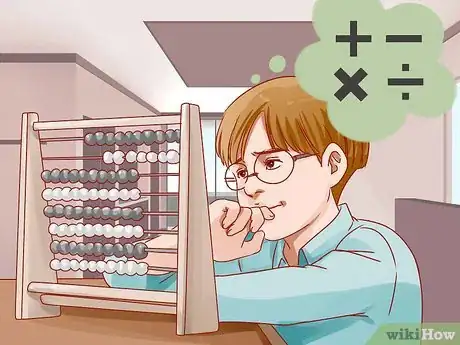


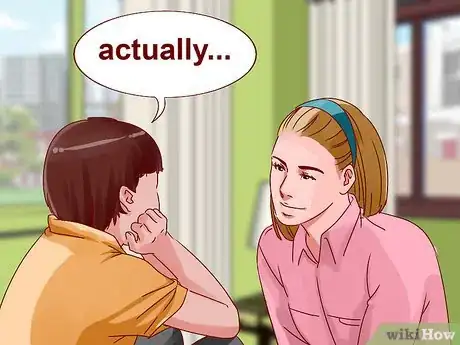

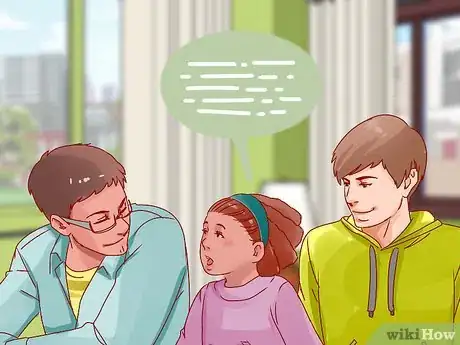
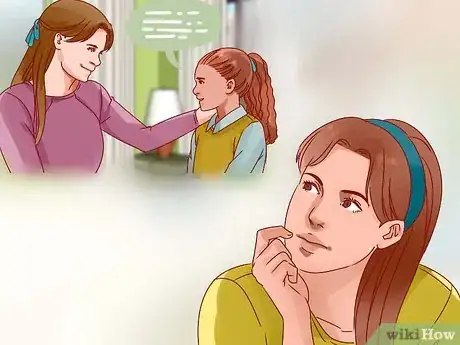

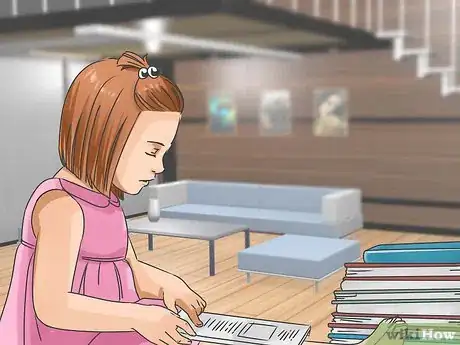
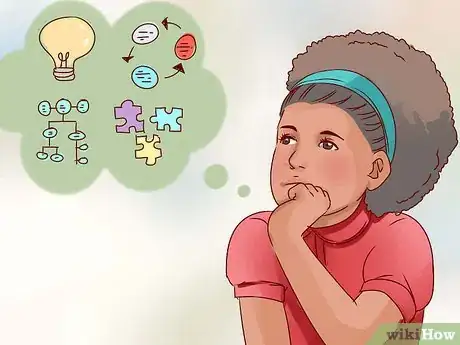
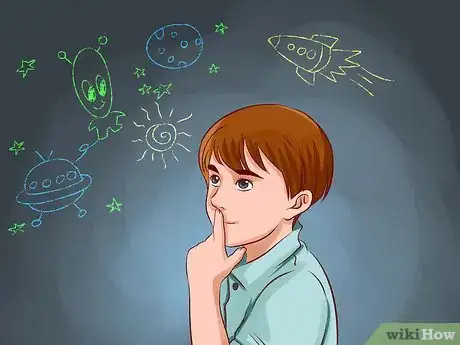
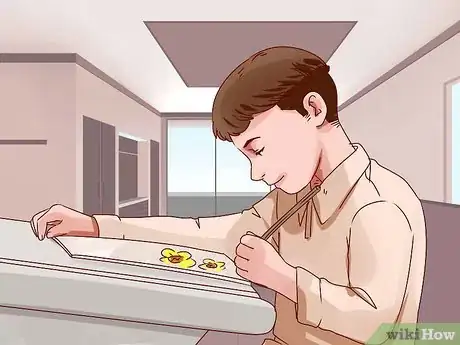

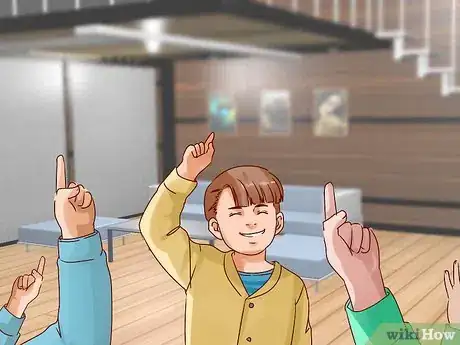

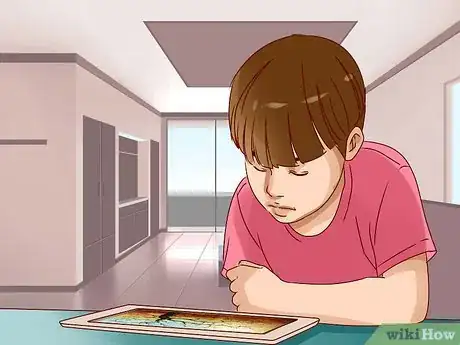


-Step-8.webp)























-Step-8.webp)





































